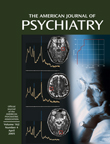Letter to the EditorFull Access
Published Online:1 Apr 2005https://doi.org/10.1176/appi.ajp.162.4.815
- Cited by
- 3 May 2022 | Expert Opinion on Drug Safety, Vol. 21, No. 6
- Experimental Neurology, Vol. 343
- 6 February 2021 | Neuropsychopharmacology Reports, Vol. 41, No. 1
- 23 October 2020 | Pharmaceuticals, Vol. 13, No. 11
- 4 February 2020 | Journal of Analytical Toxicology, Vol. 44, No. 5
- 6 April 2020 | Archives of Toxicology, Vol. 94, No. 4
- 17 December 2020 | Therapeutic Advances in Psychopharmacology, Vol. 10
- Improvement of hallucinogen persisting perception disorder (HPPD) with oral risperidone: case report29 November 2013 | Irish Journal of Psychological Medicine, Vol. 31, No. 1
- 2 February 2012
- 29 December 2010 | Drug Testing and Analysis, Vol. 3, No. 9
- Physiology & Behavior, Vol. 103, No. 2
- 14 March 2007 | Psychiatry and Clinical Neurosciences, Vol. 61, No. 2
- 1 September 2016 | Psychological Reports, Vol. 98, No. 3



